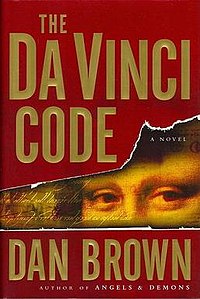By Dan Brown
★★★★☆
Four Things I Liked About The Da Vinci Code:
1. Page-turner
2. National Treasure-type intellectual adventure
3. Codes! Spies! Intrigue!
4. History gone wild
I know I’m like really late reading this book; the craze was six or seven years ago. But I was young at the time, too young to read The Da Vinci Code. For a couple years now I’ve been meaning to remedy my lack of Da Vinci Code knowledge, to find out what all the hype is about, and whether the book really lives up to it. The verdict? Yeah, I think it does. The Da Vinci Code’s reputation was for being a fast-paced, enthralling read, for proposing a semi-scandalous alternative church history that made it a blasphemous book in certain circles, though ultimately a harmless hypothetical, FICTIONAL adventure. And that’s exactly what it was.
There’s only so much you can say about the storyline without exposing information that so thrillingly unfolds as you read, so although many of you may already have read this book and are thus immune to spoilers, I will keep my description barebones. The Da Vinci Code is an academic’s adventure through and through. Implicated in the death of Louvre head curator Jacques Sauniere, Harvard scholar and world-renowned symbologist Robert Langdon teams up with cryptologist agent Sophie Arveu to exonerate himself by tracking down the curator’s real killer. Their investigation finds them quickly embroiled in the complicated real-life plot of a fantasy quest - for the Holy Grail. The Da Vinci Code has everything a good thriller should: a high-stakes scavenger hunt, danger, intrigue, betrayal, romantic tension, scandal… it’s no wonder it was such a runaway bestseller.
You don’t have to believe that The Da Vinci Code’s theories might be true - or even think they could be - for it to be a thought-provoking read on some level. Whatever your reaction to the radical theories proposed in the story, it is interesting to contemplate what would happen if the rediscovery of forgotten, unknown, lost ancient documents were uncovered that caused an upheaval of our current understanding of world history. How would such a fundamental shift in our knowledge of the past change our world in the present? It’s an intriguing thought. Given the right knowledge, that upheaval could be tremendous, to the point of being unsettling to think about. Our history informs who we are today, as individuals and as societies. If that were to change… it would call into question the most fundamental constructs of our identities as human beings, would it not? Another theme that arises in The Da Vinci Code that I think captures people’s fascination is the idea of age-old mystery persisting into our modern era; the romantic notions of scandalous secret societies and dangerous, adventuresome quests that seem confined to the pages of historical fiction - but translated into a modern setting.
The Da Vinci Code isn’t one of the best books I’ve ever read, but it captures the imagination and kept me on the edge of my seat, and I’m a firm believer that those things count for a lot more than certain readers give them credit for.
Conversation Starter: Did you read The Da Vinci Code when it was popular? If so, did it live up to the hype for you? If not, how come?
Books Read This Year: 91
Top 100 Progress: 47/100


No comments:
Post a Comment